Highlights from the Annual Meeting of the
Western MCH Nutrition Leadership Network
Contributed by the UCLA Partners in Excellence for Training in MCH Nutrition
Trainees:
Miranda Westfall, RD (UCLA) Jonae Perez (UW)
Lucille Glaize (OHSU) Ingrid Hernandez (UNM)
Erin Murray, MSPH, RD (CSU)
The MCHB-funded UCLA Partners in Excellence for Training in MCH Nutrition (Partners) is a collaboration between the University of California, Los Angeles (UCLA) and the Universities of Washington (UW) and New Mexico (UNM), Colorado State University (CSU) and Oregon Health and Science University (OHSU). The goal of the training program is to develop leadership, advance scholarship and promote partnerships for the improvement of the nutritional health of mothers and children, including those with special needs and their families, especially in the West.
Taking advantage of their regional scope, the Partners have collaborated with nutrition leaders in the 13 western states to form the Western MCH Nutrition Leadership Network (NLN). Among other networking activities, the Partners have organized annual NLN meetings to promote communication and provide continuing education both around cutting-edge MCH nutrition issues as well as leadership development. This year was the 16th meeting and was co-sponsored, for the first time, by the newly-funded Nutrition Leadership Training Program at UC Berkeley. The meeting was held in Los Angeles, CA on April 10-11, 2014, entitled: “Public Health Nutrition in a Changing Health System: Looking to the Future”. We, as current trainees and future MCH nutrition professionals, are excited to share some of the knowledge and enthusiasm we gained from this year’s speakers in our summaries below. Please visit the Partners’ website at http://www.mchnutritionpartners.ucla.edu/ to learn more about the NLN and become a member!

Partners
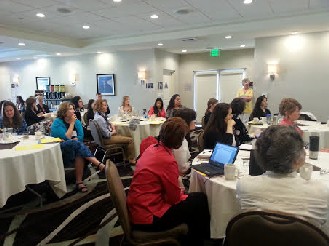
Conference Day 1
The Food Environment: Cues that Drive Behavior and Influence Choice
Kathryn I Hoy, MFN, RD, CDN
Kate Hoy, of the Center for Behavioral Economics in Child Nutrition at Cornell University, started off the NLN conference with high energy and thought-provoking ideas regarding our food environment. Kate discussed a variety of research findings about food psychology in school lunchrooms, at home, and in the office environment from the Cornell Food and Brand Lab research center. She reported fascinating evidence-based facts about serving size perception as it relates to the size, shape, and even color of
serving dishes and food items. Kate introduced how we can utilize “choice architecture” to influence food choice and behavior through fine details of the eating environment such as the availability of a variety of food items during a meal and the particular arrangement of these food items on the plate.
Kate included entertaining anecdotes about each topic she presented throughout her presentation. The information and literature Kate reviewed was practical, and was presented in a way for audience members to be able to immediately apply the information in schools, at home, and at the workplace. Incorporating questions and comments throughout the presentation made for an engaging and effective talk. The original articles of the research as well as short videos of the studies can be found on the Cornell Food and Brand Lab website (http://www.foodpsychology.cornell.edu/index.html).
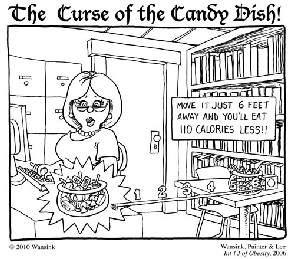
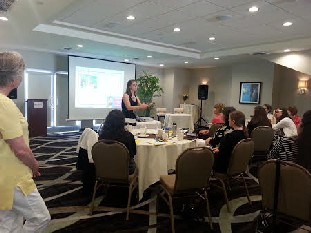
Kate Hoy’s presentation
Project Echo: Extension for Community Healthcare Outcomes
Bruce Struminger, MC, MA, FACP
Dr. Bruce Struminger, MD, MA, FACP introduced Project ECHO (Extension for Community Healthcare Outcomes), an innovative model of healthcare designed to expand access to specialized care in traditionally underserved, rural communities. In New Mexico, where 32 of 33 counties are listed as Medically Underserved Areas, Project ECHO has been instrumental in expanding access to safe, effective specialty care for chronic diseases in rural health centers. Project ECHO utilizes telehealth technology to bring knowledge and best-practices from the experts at the University of New Mexico to rural primary care physicians in community based centers where this specialty care was previously unavailable. Weekly 2-hour telemedicine clinics allow rural practitioners to present complicated cases to a team of specialists at the New Mexico Health Sciences Center. Project ECHO hopes to disseminate the telehealth model nationally and globally to leverage scarce healthcare resources and improve local capacity to safely and effectively treat complex health problems in rural and underserved areas.
Telemedicine provides a promising model for expanding access to nutrition services to rural communities. As an example, in Iowa, there are three Child Health Specialty Clinic dietitians who are responsible for providing nutrition services to almost 200 children with special health care needs across the state. To meet these geographical challenges, the dietitians utilize technologies such as webcams to connect with the children’s families and caregivers to provide specialty nutrition services in the absence of qualified local providers.
Developing Webinars as an Educational Tool:
Effective Webinars: An audience-centric approach (aka: 3 is a magic number)
Glynis Shea and Kristen Tiepel
Friday was dedicated to a developing effective webinars workshop given by Glynis Shea and Kristen Tiepel from the University of Minnesota’s Konopka Institute for Best Practices in Adolescent Health. The guest speakers began this wonderfully interactive day by asking us to identify our own personal learning styles, which quickly reminded us that there is not a single teaching style that addresses everyone’s needs. Appropriately, the entire day was designed to engage us and provide tools for reaching all types of learners. The speakers were animated and clever in identifying frequent problems with webinars, and provided many ‘out of the box’ ideas for creating effective presentations.
A continuous theme throughout the workshop was the value of using the “rule of three” when planning effective presentations. This concept was introduced in a fun way to engage audience participation through competitive tracking of the number of times the number three was used during their presentation. Before we knew it, people were wrestling over goofy prizes in the middle of each table when this “magical” number was mentioned. The speakers boldly dared us to connect with audiences using wild PowerPoint slides with fewer words, tangible examples, passionate and dramatic voices, and interactive webinar tools. When the webinar concluded, there was a general consensus that the workshop was enlightening, compelling, and resourceful.
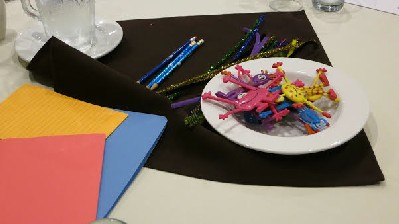
“Magical Number 3” prizes
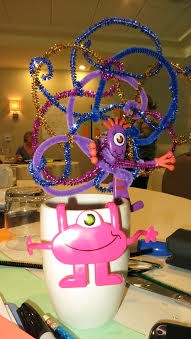
Craft project by Partner, Dr. Marion Taylor Baer
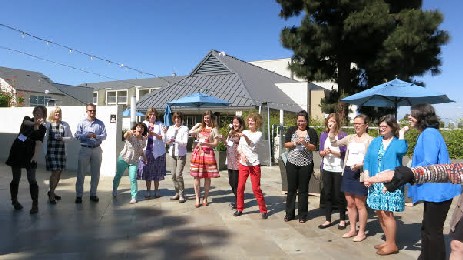
Sharing lessons learned from the Effective Webinars presentation
Networking and Sharing Sessions
Between presentations, Partners and Trainees led sharing sessions developed to promote sharing of best-practices and lessons learned between NLN members:
- Partner Marion Taylor Baer, PhD, RD (UCLA) led a discussion on the
Affordable Care Act (ACA). Each participant gave an update on the progress of implementation of the ACA in their states and what they saw as benefits and challenges for nutrition services.
- Current Trainees from the five Partner Universities, Lucy Glaize (OHSU), Ingrid Hernandez (UNM), Erin Murray, MSPH, RD (CSU), Jonae Perez (UW), Miranda Westfall, RD (UCLA) presented the Life Course Nutrition: Maternal and Child Health Strategies in Public Health, a free, 75 minute online-module created by the Partners. Based on the life course framework, the module is designed to help public health leaders describe the role of maternal and child nutrition in
population health and identify actions they can take to create equitable access to healthy foods and food environments. Please click here for details on the Life Course Nutrition module. - Thursday concluded with the much anticipated annual NLN Sharing Session, during which NLN members from each state present a brief abstract of a chosen project currently being implemented in their organization. Topics of interest this year included food security, breastfeeding and policy issues. As stated by one NLN member, “There is nothing as valuable to me, as a public health professional, as learning from the ‘best of the best,’ discussing, processing ideas. This network annual meeting provides this forum like no other.”
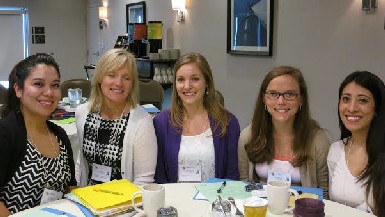
Trainees
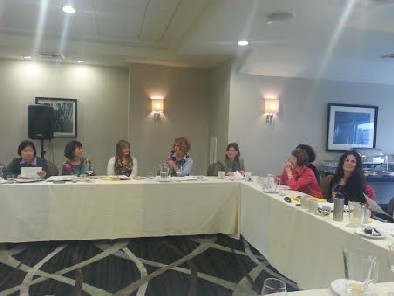
NLN Sharing Session